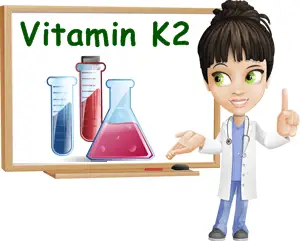Only recently discovered, vitamin K2 has come to the attention of the international scientific and medical communities as a revolutionary aid in the treatment of cardiovascular disease and osteoporosis. Cardiovascular disease is the most common cause of death in most industrialized countries and is both caused and aggravated by many factors, including vitamin and mineral deficiencies, poor diet, lack of exercise, alcohol consumption, smoking and bad lifestyle habits in general, as well as genetics.
Osteoporosis occurs as a result of poor bone mineralization or bone demineralization and is aggravated by vitamin and mineral deficiencies, old age, hormonal imbalances and thyroid disorders, alcohol consumption and so on. Vitamin K2, which has only recently been discovered, has been found to help with both of these conditions and can be found in a variety of easily accessible foods.

The vitamin K family is known to include vitamin K1 (phylloquinone) and vitamin K2 (menaquinones). The difference between the two is that vitamin K1 is found in great amounts in green leafy vegetables, vegetable oils and dairy products, while vitamin K2 is found in great amounts in foods of animal origin as well as fermented foods. For example, Natto, a traditional Japanese dish made from soybeans fermented with a probiotic called the hay bacillus, also known as the grass bacillus (Bacillus subtilis) is believed to be richest in vitamin K2.
According to the National Nutrient Database for Standard Reference, 100 g of Natto contains good amounts of calcium and provides us with 25% to 50% of the daily recommended allowance of iron, calcium, magnesium and zinc, not to mention a lot of vitamin K2.
While vitamin K1 is synthesized by plants, vitamin K2 is synthesized by animals from the first, meaning they are both natural forms of the vitamin. The group also includes vitamins K3, K4 and K5, but these are synthetic, with K3 exhibiting toxic effects in humans. Vitamin K2 helps synthesize proteins that help coagulate blood, maximizes calcium absorption in bones (and teeth), prevents artery (arterial) calcification as well as calcium deposits in joints and areas alike, boasting similar benefits to vitamin K1. But what should you eat to get your vitamin K2 intake? Find out below what are the best 7 food sources of vitamin K2.

Best food sources of vitamin K2
Natto
This traditional Japanese dish is made by fermenting soy beans with a probiotic bacteria called Bacillus subtilis. Unlike other soybean products, Natto is recognized as a healthy food with beneficial effects on human health.
Aged cheeses or hard cheeses
This includes matured cheese made from sheep, goat as well as cow cheese. Highest concentrations of vitamin K2 are found in matured goat and sheep cheese.
Fresh cheese or soft cheeses
Again, made from goat, sheep or cow milk. Soft goat milk cheese and soft sheep milk cheese are richest in vitamin K2.
Egg yolk
Apparently, egg yolk is an excellent source of vitamin K2. Remember, however, that the healthiest are naturally-produced, free-range, organic eggs. Choose your favorite egg variety and find out more about its health benefits on the eggs page.
Liver
This includes goose liver, chicken liver, beef liver. Generally, liver is also a great source of protein and vitamin B12 and vitamin A, all essential nutrients of great value for good health.
Chicken and goose meat
Vitamin K2 can be found in generous amounts in chicken breast and chicken leg as well as goose leg.
Kefir and buttermilk
Kefir or milk kefir and buttermilk are said to be good sources of vitamin K2. The two milk products are a result of fermentation, hence their significant content of the nutrient.
About vitamin K2 absorption
Although a percentage of the scientific community advocates that humans can turn vitamin K1 into vitamin K2 at the intestinal level and thus do not require the latter, there are studies that argue against this. First of all, it has been shown that vitamin K2 production decreases greatly with old age.
Taking antibiotics is known to impede the synthesis of vitamin K2 at the intestinal level. Generally, antibiotics destroy gut microflora and prevent the synthesis of several essential nutrients, particularly B vitamins, including vitamin B12. Also, many people have a low intake of green leafy vegetables rich in vitamin K1 and thus cannot produce sufficient vitamin K2 either. Not to mention bowel disease and gastrointestinal disorders in general affect K2 synthesis immensely.
For these reasons, it is important to make sure your diet includes foods rich in vitamin K2. This contributes to improving your health and general well-being and brings about a wide range of long-term benefits such as those listed below.
What are the benefits of vitamin K2?
Helps prevent heart disease
Having enough vitamin K2 in your diet can help prevent calcium deposits from forming on the artery walls around the heart, which represents an enormous risks for heart disease. It also prevents calcium from depositing on joints.
Lowers osteoporosis risks
Vitamin K2 plays an important part in calcium metabolism. Calcium is the principal constituent of bones and vitamin K2 improves bone health by ensuring that calcium goes into our bones, contributing to their mineralization and making them stronger and less prone to fractures.
Improves dental health
Vitamin K2 helps improve dental health by means of its involvement in calcium metabolism, ensuring our teeth receive their share of calcium and stay strong and healthy.
Ensures proper blood coagulation
Similar to K1, vitamin K2 supports blood coagulation processes, preventing blood loss as a result of wound bleeding. Nevertheless, it is best to consult with your doctor prior to introducing vitamin K2-rich foods in your diet, especially if you are prescribed anticoagulant medication such as Warfarin or are at risk for blood clots and stroke. Vitamin K2 can, in such cases, increase your risk of developing blood clots as a result of it supporting blood coagulation processes.
Also see what are the benefits of vitamin K1.
Conclusion
Although its role in the human body and complete health effects are poorly understood, vitamin K2 has already proven it is an essential nutrient with a variety of great health benefits. Incorporating it into your diet can improve your health immensely, but be careful with it if you have been prescribed anticoagulant medication because, similar to vitamin K1, it also encourages blood coagulation and may lead to the formation of blood clots, especially when intake is high.
